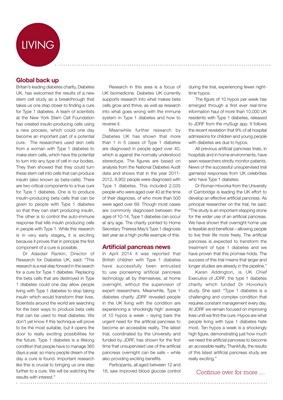
LIVING
Global back up
Britain's leading diabetes charity, Diabetes
UK, has welcomed the results of a new
stem cell study as a breakthrough that
takes us one step closer to finding a cure
for Type 1 diabetes. A team of scientists
at the New York Stem Cell Foundation
has created insulin-producing cells using
a new process, which could one day
become an important part of a potential
cure. The researchers used skin cells
from a woman with Type 1 diabetes to
make stem cells, which have the potential
to turn into any type of cell in our bodies.
They then showed that they could turn
these stem cell into cells that can produce
insulin (also known as beta-cells). There
are two critical components to a true cure
for Type 1 diabetes. One is to produce
insulin-producing beta cells that can be
given to people with Type 1 diabetes
so that they can start producing insulin.
The other is to control the auto-immune
response that kills insulin producing cells
in people with Type 1. While this research
is in very early stages, it is exciting
because it proves that in principle the first
component of a cure is possible.
Dr Alasdair Rankin, Director of
Research for Diabetes UK, said: "This
research is a real step forward in the search
for a cure for Type 1 diabetes. Replacing
the beta cells that are destroyed in Type
1 diabetes could one day allow people
living with Type 1 diabetes to stop taking
insulin which would transform their lives.
Scientists around the world are searching
for the best ways to produce beta cells
that can be used to treat diabetes. We
don't yet know if this technique will prove
to be the most suitable, but it opens the
door to really exciting possibilities for
the future. Type 1 diabetes is a lifelong
condition that people have to manage 365
days a year, so many people dream of the
day a cure is found. Important research
like this is crucial to bringing us one step
further to a cure. We will be watching the
results with interest."
Research in this area is a focus of
UK biomedicine. Diabetes UK currently
supports research into what makes beta
cells grow and thrive, as well as research
into what goes wrong with the immune
system in Type 1 diabetes and how to
reverse it.
Meanwhile further research by
Diabetes UK has shown that more
than 1 in 5 cases of Type 1 diabetes
are diagnosed in people aged over 40,
which is against the normally understood
stereotype. The figures are based on
analysis from the National Diabetes Audit
data and shows that in the year 2011-
2012, 8,952 people were diagnosed with
Type 1 diabetes. This included 2,035
people who were aged over 40 at the time
of their diagnosis, of who more than 500
were aged over 69. Though most cases
are commonly diagnosed between the
ages of 10-14, Type 1 diabetes can occur
at any age. The charity pointed to Home
Secretary Theresa May's Type 1 diagnosis
last year as a high profile example of this.
Artificial pancreas news
In April 2014 it was reported that
British children with Type 1 diabetes
have successfully been entrusted
to use pioneering artificial pancreas
technology all by themselves, at home
overnight, without the supervision of
expert researchers. Meanwhile, Type 1
diabetes charity JDRF revealed people
in the UK living with the condition are
experiencing a 'shockingly high' average
of ten hypos a week - laying bare the
urgent need for the artificial pancreas to
become an accessible reality. The latest
trial, coordinated by the University and
funded by JDRF, has shown for the first
time globally that unsupervised use of the
artificial pancreas overnight can be safe -
while also providing exciting benefits.
Participants, all aged between 12 and
18, saw improved blood glucose control
during the trial, experiencing fewer nighttime hypos.
The figure of ten hypos per
week has emerged through a first ever
real-time information haul of more than
10,000 UK residents with Type 1 diabetes,
released to JDRF from the mySugr app.
It follows the recent revelation that 9% of
all hospital admissions for children and
young people with diabetes are due to
hypos.
All previous artificial pancreas trials, in
hospitals and in home environments, have
seen researchers strictly monitor patients.
News of the successful unsupervised trial
garnered responses from UK celebrities
who have Type 1 diabetes.
Actor Jeremy Irvine, who is a JDRF
supporter, has lived with Type 1 diabetes
since the age of six. He said: "When the
chance came for me to take part in early
artificial pancreas trials a few years ago,
I jumped at the opportunity. I wanted to
play my own very small part in moving
the artificial pancreas closer to reality. I'm
really excited to hear of this latest progress
- the scientists behind it are my heroes."
Television presenter Dominic
Littlewood gave his reaction to the
statistic showing that UK people with
type 1 diabetes are having 10 hypos a
week. He said: "I have lived with type 1